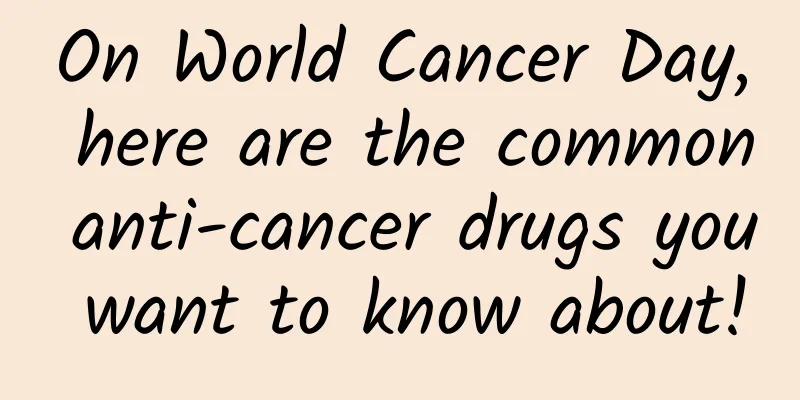On World Cancer Day, here are the common anti-cancer drugs you want to know about!

|
With the rapid changes in people's lifestyles and the increasing mental stress, the incidence of tumors in my country has been rising year by year. With the continuous progress of medical care, we have also changed from the negative mentality of "cancer is scary" to the courageous attitude of "we can, I can beat cancer". Choose a healthy lifestyle, take standardized anti-tumor drug treatment, and let the tumor go away! Data source: The World Health Organization's International Agency for Research on Cancer (IARC)'s latest global cancer burden data in 2020 When talking to oncologists or cancer patients, we often hear three words: chemotherapy, targeted therapy, and immunotherapy . But what do they mean? Even some patients who have been fighting cancer for many years have not figured out these three treatment methods. Let's follow Chao Chaoyangyang to learn more about them today! 1. What is chemotherapy? First, let's talk about chemotherapy. Chemotherapy is the gold standard treatment for many tumors. When many people mention tumor treatment, the first thing they think of is "chemotherapy"; so what exactly is chemotherapy? The so-called "chemotherapy" is actually the abbreviation of chemical drug treatment. It achieves the purpose of treatment by using chemotherapeutic drugs, such as broad-spectrum anticancer drugs cisplatin and fluorouracil, to kill cancer cells in the body. Chemotherapy drugs will spread throughout most organs and tissues of the body through blood circulation, so they will also play a role in those cancer cells that have actually metastasized and potential metastatic lesions that have not been detected. The common mechanisms of action of chemotherapy drugs can be simply summarized into the following four types : (1) Inhibit nucleic acid anabolism; (2) Directly participate in DNA action and directly interfere with tumor replication; (3) Prevent spindle formation and hinder mitosis; (4) Inhibit protein synthesis. Chemotherapy is almost an indispensable treatment method for tumors. According to the different application time and purpose, we divide chemotherapy into "neoadjuvant chemotherapy" and "adjuvant chemotherapy". There are the following differences between these two methods: Different application times: Neoadjuvant chemotherapy is mainly used before surgery, while adjuvant chemotherapy is mostly performed after surgical resection, especially after radical surgery. Different purposes of use: Neoadjuvant chemotherapy is used before surgery to reduce the size of the tumor, lower the patient's tumor stage, and enable it to meet the surgical resection index, reduce the spread and metastasis during the operation, and thus achieve the purpose of complete tumor resection. Adjuvant chemotherapy can only be used as an auxiliary treatment after surgery, mainly for people with high recurrence and high metastasis of cancer. After adhering to the course of adjuvant chemotherapy, cancer cells in the body can be eliminated, thus avoiding recurrence in the later stage. 2. What is targeted therapy? After talking about chemotherapy, let's talk about "targeted therapy". Targeted therapy is a drug that can better distinguish between tumor cells and normal cells. Targeted drugs are mainly used to treat various target mutations, that is , drugs that target the marker molecules of tumor cells and intervene in the process of cell canceration . The purpose of targeted therapy is to find and attack specific areas or substances in cancer cells, or to detect and prevent specific information sent by cancer cells to direct cell growth. Some substances in cancer cells can become “targets” for targeted therapy, including [1]: Ø Proteins that are excessive in cancer cells; Ø Proteins that cancer cells have but normal cells do not; Ø A mutated protein present in cancer cells; Ø Changes in genes (DNA) that are not found in normal cells. The effects of targeted drugs include[1]: Ø Block or shut down the chemical signals that direct cancer cells to grow and divide; Ø Change the proteins in cancer cells, causing cancer cells to die; Ø Prevent the formation of new blood vessels that feed cancer cells; Ø Stimulate the immune system to kill cancer cells; Ø Carry toxins that kill cancer cells but do not harm normal cells. Taking lung cancer as an example, genetic testing can be used to understand whether there are mutations in genes such as EGFR , ALK, and ROS1, so that appropriate targeted drugs can be selected for treatment. Compared with chemotherapy, targeted therapy can kill tumor cells more accurately and reduce the rate of "killing innocent people by mistake". Currently, not all tumors can be treated with targeted drugs, and some tumors are mainly treated with chemotherapy . 3. What is immunotherapy? Finally, there is immunotherapy, which actually refers to activating the human immune system through drugs, and then allowing a large number of active immune cells to become real anti-cancer weapons, thereby clearing tumor cells. It has a different treatment mechanism and effect from traditional chemotherapy and radiotherapy. Immunotherapy mainly includes immune checkpoint inhibitors (ICIs), chimeric antigen receptor T cell immunotherapy (CAR-T), etc. The most representative of these are the well-known ICIs, of which PD-1 and PD-L1 inhibitors are representatives. They block the binding of PD-L1 on the surface of cancer cells to PD-1 on the surface of T cells, block the function of immune checkpoints, activate the body's immune system, and enable T cells to attack tumor cells, thereby achieving the effect of killing tumor cells [2]. Currently, the most widely used ICIs include pembrolizumab, nivolumab, tislelizumab, and toripalimab. Can all patients be treated with ICIs? Not really! Before starting treatment, patients need to undergo a series of tests. First, immunohistochemistry is needed to detect PD-L1 expression, which can identify patients who may be effective for immunotherapy. In addition, clinical evaluations of blood routine, liver and kidney function, hormone levels, cardiopulmonary function, etc. are required. Autoimmune diseases and severe cardiopulmonary dysfunction need to be excluded before immunotherapy can be started. At the same time, before each course of treatment, multiple tests such as electrocardiogram, blood routine, liver and kidney function should be performed, and treatment can only be started after professional evaluation by a doctor [3]. After reading the explanation of these three tumor treatment methods, do you have a preliminary understanding of tumor treatment? At the same time, you should also know that chemotherapy, targeted therapy, and immunotherapy are all means of anti-tumor treatment. There is no saying which one is better or worse. The only way to choose the best treatment is to choose the treatment method that is more suitable for the patient's current tumor condition. References 1. Zhang Yu, Du Luba, Sun Haoran, et al. Research progress in molecular targeted therapy of tumors[J]. Journal of Fudan University (Medical Edition), 2016, 43 (01): 115-121. 2. Luo W, Quan Q, Lin D F, et al. Application progress of immune checkpoint inhibitors in tumor treatment[J]. Chinese Journal of Cell Biology, 2023, 45(12):1886-1895. 3. Sun Hui, Niu Yuping. Research progress in tumor immunotherapy[J]. Journal of Lanzhou University (Medical Edition), 2023, 49 (12): 1-6. |
>>: Sad! 19-year-old boy died of stomach cancer! Doctor sighed: These eating habits ruined him...
Recommend
The specific time of women's safe period and dangerous period
Many friends may not understand about women's...
Breasts remain tender during lactation
Although women's breasts are softer than othe...
Reasons why vaginal discharge suddenly turns brown
If your leucorrhea suddenly turns brown, it usual...
What should I do if I have chest pain during my period?
Menstruation is a normal physiological reaction d...
Pictures of eczema around the breast
Breast eczema, like eczema occurring in other par...
How to make a sandwich with luncheon meat Tuna sandwich recipe
Many lazy people don't want to cook because t...
Causes of three-month fetal arrest
When a woman finds out she is pregnant, she shoul...
How many days does it take to clean up the lochia after childbirth?
Compared with women who choose natural birth, wom...
Diet for the first three days of normal delivery
The first three days after a woman gives birth ar...
Is it good for pregnant women to eat red bean soup frequently?
Everyone knows that eating red beans can replenis...
Sperm fertility after 36 hours
Pregnancy is an extremely delicate process, and g...
National Liver Care Day丨These 5 abnormalities in the body may be the liver's "call for help"...
Expert of this article: Li Zhao, Chief Physician ...
What causes women to have odor down there?
What causes the odor in women's private parts...
Cold feet at night
Cold hands and feet when sleeping at night is rel...
What causes fluid accumulation in the fallopian tube?
What causes water to accumulate in the fallopian ...









